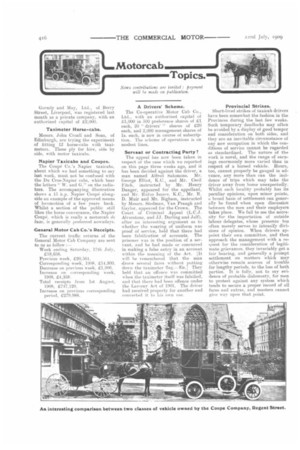Motorcab Topics.
Page 14

If you've noticed an error in this article please click here to report it so we can fix it.
News contributions are invited : payment will be made on Publications.
Gormly and May, Ltd., of Berry Street, Liverpool, was registered last month as a private company, with an authorized capital of £2,000.
Taximeter Horse-cabs.
Messrs. John Croat' and Sons, of Edinburgh, are trying the experiment of fitting 12 horse-cabs with taximeters. These ply for hire, side by side, with motor taxicabs.
Napier Taxicabs and Coupes.
The Coupe Co.'s Napier taxicabs, about which we had something to say last week, must not he confused with the Du Cros-Napier cabs, which bear the letters " W. and G." on the radiators. The accompanying illustration shows a 15 fi.p. Napier Coupe alongside an example of the approved means of locomotion of a few years back. Whilst a section of the public still likes the horse conveyance, the Napier Coupe, which is really a motorcab de luxe, is generally preferred nowadays.
General Motor Cab Co.'s Receipts. The current traffic returns of the General Motor Cab Company are sent to us as follow :—
Week ending Saturday, 17th July, £18,658.
Previous week, £20,564.
Corresponding week, 1908, £14,300. Decrease on previous week, £1,906. Increase on corresponding week,
1908, £4,358.
Total receipts from 1st August, 1908, £747,120.
Increase on previous corresponding period, £279.988.
A Drivers' Scheme.
The Co-operative Motor Cab Co., Ltd., with an authorized capital of £1,000 in 500 preference shares of £1 each, 20 "drivers' " shares of £20 each, and 2,000 management shares of is. each, is now in course of subscription. The scheme of operations is on modest lines.
Servant or Contracting Party ?
The appeal has now been taken in respect of the case which we reported on this page three weeks ago, and it has been decided against the driver, a man named Alfred Salomons. Mr. George Elliot, K.C., and Mr. Cecil Fitch, instructed by Mr. Henry Danger, appeared for the appellant, and Mr. Rufus Isaacs. K.C., Mr. R. D. Muir and Mr. Bigham, instructed by Messrs. Stedman, Van Praagh and Gaylor, appeared for the Crown. The Court of Criminal Appeal (L.C.J. Alverstone, and J.J. Darling and Jelf), after an interesting argument as to whether the wearing of uniform was proof of service, held that there had been falsification of accounts. The prisoner was in the position of a servant, and he had made or concurred in making a false entry in an account within the meaning of the Act. [It will be remembered that the man slrose several fares without putting down the ta x i me ter fl ag . —En .] They held that an offence was committed when the taximeter itself was falsified, and that there had been offence under the Larceny Act of 1901. The driver had received property for another and converted it to his own use.
Provincial Strikes.
Short-lived strikes of taxicab drivers have been somewhat the fashion in the Provinces during the last few weeks. Such temporary deadlocks may often be avoided by a display of good temper and consideration on both sides, and they are an inevitable circumstance of any new occupation in which the conditions of service cannot be regarded as standardized. The nature of the work is novel, and the range of earnings enormously more varied than in respect of a horsed vehicle. Hours, too, cannot properly be gauged in advance, any more than can the incidence of trips which may take the driver away from home unexpectedly. Whilst each locality probably has its peculiar opinions, upon minor points. a broad basis of settlement can generally be found when open discussion between the men and their employers takes place. We fail to see the necessity for the importation of outside labour delegates, whose presence too often merely serves to intensify divisions of opinion. When drivers appoint their own committee, and then approach the management with a request for the consideration of legitimate grievances, they invariably get a fair hearing, and generally a prompt settlement on matters which may otherwise remain sources of trouble for lengthy periods, to the loss of both parties. It is folly, not to say evidence of probable dishonesty, for men to protest against any system which tends to secure a proper record of all fares and extras, and masters cannot give way upon that point.






















